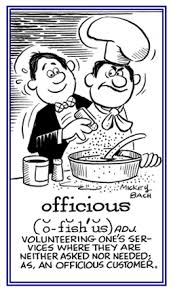
记忆方法
将“officious”拆分为“off”和“icious”。想象一个人在“off”(远离)人们,但他们的行为“icious”(像食物一样吸引人)却显得让人反感,因为虽然这种行为似乎吸引人,但实际上是不受欢迎的、多管闲事的。通过这样的联想,可以帮助记忆这个单词的含义。
以上内容由AI生成, 仅供参考和借鉴
中文词源
officious 爱指手划脚的
来自office,办公室,办公地,-ous,形容词后缀。原指履行办公职责的,尽心服务的,后词义贬义化。
英语词源
- officious (adj.)
- 1560s, "zealous, eager to serve," from Latin officiosus "full of courtesy, dutiful, obliging," from officium "duty, service" (see office). Sense of "meddlesome, doing more than is asked or required" had emerged by 1600 (in officiously). An officious lie (1570s) is one told to do good to another person (from Latin mendocium officiosum or French mensonge officieux). Related: Officiousness.
权威例句
- 1. a nasty officious little man
- 讨厌、好管闲事的家伙
- 2. When people put on uniforms, their attitude becomes more confident and their manner more officious.
- 人们穿上制服后会信心倍增,也更爱管闲事了。
- 3. They wouldn't welcome any officious interference from the police.
- 他们不会欢迎任何来自警方的横加干涉。
- 4. He is a harsh man, at once pompous and officious.
- 他是个严酷的人, 既自负又爱管闲事.
- 5. He had a reputation for being politically officious and self - serving.
- 他因在政治上爱管闲事和个人奋斗而出名.